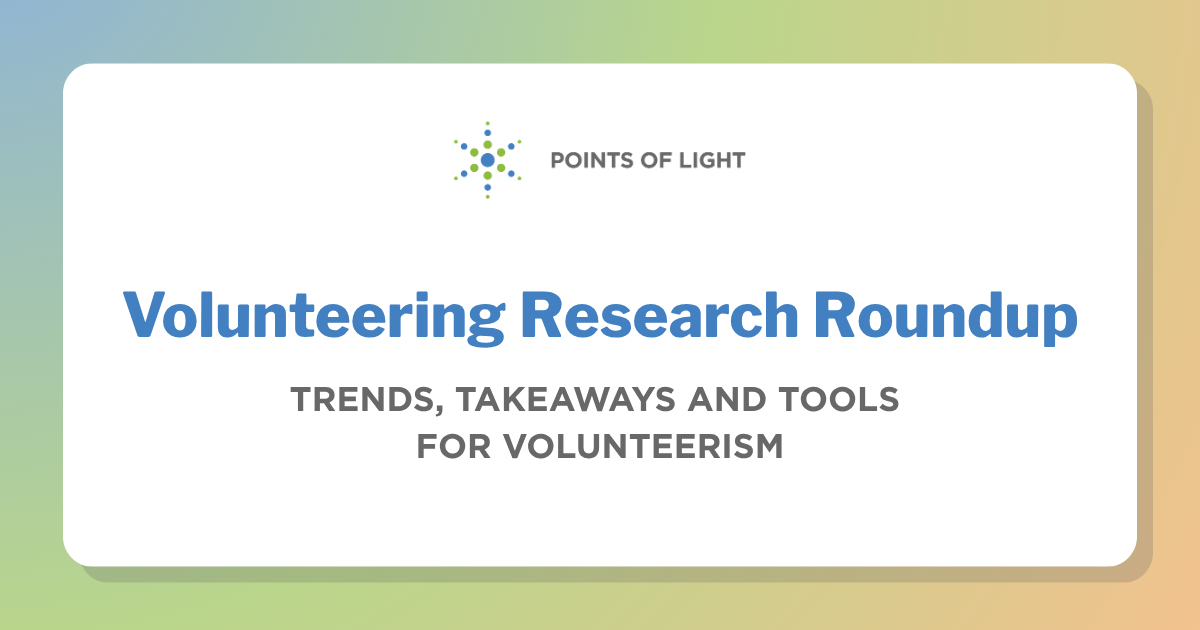Volunteering Research Roundup: Social Bonds, Who Volunteers & Corporate Impact

Welcome to the latest issue of our quarterly research series from Points of Light. Curated by our vice president of research & insights, Ferzana Havewala, this roundup highlights new and emerging research and trends shaping the nonprofit sector. We hope these insights help you champion volunteering in your community.
Building Social Bonds Through Volunteering
USA: Actively Participating in Live Events as an Avenue for Social Connection
A new study indicates that attending live, in-person events—especially recurring ones with friends—can enhance social connections and reduce loneliness. Active involvement (conversation, hands-on activities) was key to feeling more connected. While effects diminish after a day, consistent in-person gatherings like volunteer activities may sustain benefits. Useful implications for volunteer managers weighing in-person vs. virtual engagement. The team also created a toolkit, Events 4 Connection, to help communities foster meaningful connection.
Who Volunteers, and Why?
Global: Understanding who volunteers globally
Using Global Flourishing Study data (200,000+ people, 22 countries), researchers found education and religious service attendance consistently predict formal volunteering, while age, marital and immigration status matter less. Gender and employment type also shape participation. Findings point to reducing barriers and expanding access.
England: Engagement in volunteering and caring in the ‘sandwich’ generation
Among 8,000+ adults near retirement, about one in five volunteered and a similar share provided informal care. Retirees, part-time workers, women and those with good health/financial security were more likely to volunteer; full-time work reduced participation.
New Zealand: How coworker demands influence ambulance volunteers’ experience
Study of “super volunteers” identified three types—ideal workers, supporting actors and thrill seekers—each navigating freedom differently. Autonomy can both enable and undermine meaningful work, suggesting managers tailor roles and supervision.
India: Intrinsic vs. extrinsic motivation and volunteer well-being
Volunteers driven by intrinsic motivations showed significantly higher psychological well-being than those motivated by external rewards, reinforcing the value of purpose-aligned roles.
Benefits of Corporate Volunteering
Bulgaria: Corporate volunteering: strategy, contributions, and community impact
Corporate volunteering strengthens communities and boosts employee skills, satisfaction and cohesion, aiding talent attraction and brand reputation. Authors call for standardized metrics to better assess social impact.
Informal and Formal Volunteering Research
Central Europe: Do formal and informal volunteering compete?
They complement each other: people engaged in one often engage in the other. Income predicts both forms more than time availability; formal volunteering is more sensitive to resource fluctuations.
Finland: Reciprocity, values and disaster volunteering
Trust in authorities and expectations of reciprocity increase disaster volunteering. Other-focused values predict more frequent helping, offering cues for effective engagement strategies.
Trends in Volunteering
- (Global) Understanding who volunteers globally. Scientific Reports, 2025.
- (Germany) Civic norms and volunteering. Social Inclusion, 2025.
- (Switzerland) Middle-class formal volunteering over time. VOLUNTAS, 2025.
- (Philippines) Generational differences in volunteerism. GVCFI Research Journal, 2025.
Drivers of Volunteering
- (Turkey) Attracting volunteers through social media marketing. Journal of Nonprofit & Public Sector Marketing, 2025.
- (Spain) Volunteer motivation & loyalty. Voluntary Sector Review, 2025.
- (Poland) Longitudinal intentions to volunteer. VOLUNTAS, 2025.
- (USA) Faith-based motivations. Journal of Scholarly Engagement, 2025.
- (South Korea) Mandatory community service & civic growth. VOLUNTAS, 2025.
- (China) Sustained intention post-COVID. VOLUNTAS, 2025.
- (Hungary) International volunteering motivations. VOLUNTAS, 2025.
- (China) Public preferences in volunteer projects. Nonprofit Management & Leadership, 2025.
Volunteering and Well-Being
- (EU) How volunteering boosts community well-being. Journal of Management Sciences & Applications, 2025.
- (Global) NGOs’ role in life satisfaction among the elderly. VOLUNTAS, 2025.
- (South Africa) Transformative power of volunteering. TWIST, 2025.
- (USA) Volunteering & health across sexual orientations. Int’l Journal of Aging & Human Development, 2025.
- (USA) Volunteering, chronic stress & inflammation. Psychoneuroendocrinology, 2025.
- (USA) Biological aging, volunteering & cognition. Journals of Gerontology A, 2025.
- (Europe) National perceptions of over-70s & well-being. Journal of Applied Social Psychology, 2025.
Youth Volunteering
- (Egypt) Youth centers and e-volunteering culture. Future of Social Sciences, 2025.
- (USA) Early childhood education & midlife civic engagement. Education and Urban Society, 2025.
Corporate Volunteering
- (USA) Vision vividness and helping distant beneficiaries. Academy of Management Proceedings, 2025.
- (Europe) Skill-based volunteering for aging employees. European Management Journal, 2025.
- (Vietnam) CSR & Gen Z consumer priorities. Journal of Global Scholars of Marketing Science, 2025.
- (Japan) CSR, engagement & corporate volunteering climate. CSR and Environmental Management, 2025.
Impact of Volunteering & Links to Other Activities
- (Australia) Measuring volunteer commitment to a project. Preprint, 2025.
- (Germany) Volunteering & activism in media coverage. European Journal of Cultural & Political Sociology, 2025.
- (USA) Nonprofit dynamics: behavior in volunteering & fundraising. Doctoral dissertation, 2025.
Interested in tailored insights? If anything here resonates, we’d be happy to discuss or provide customized research. Contact Ferzana Havewala.
